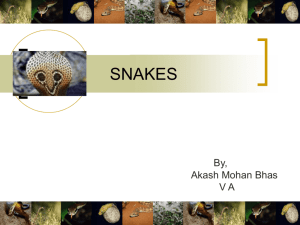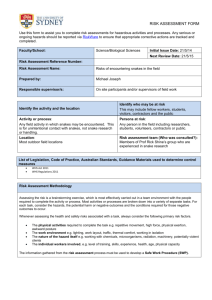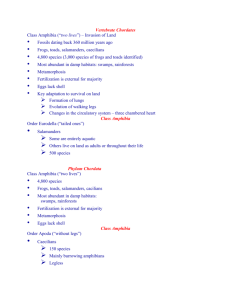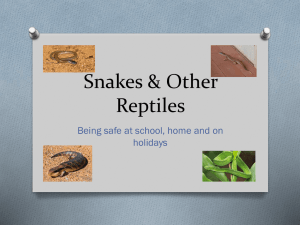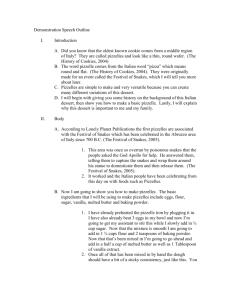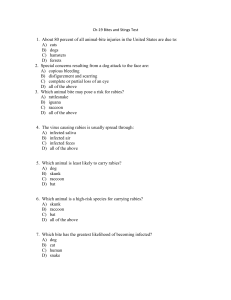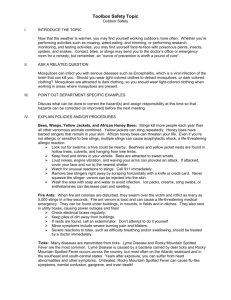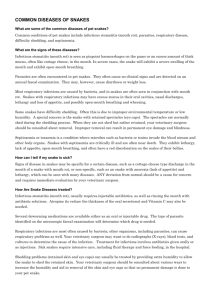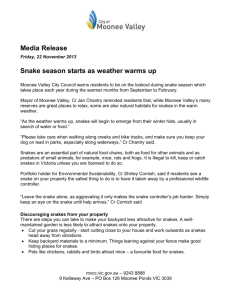Field Safety Presentation - School of Forest Resources & Conservation
advertisement
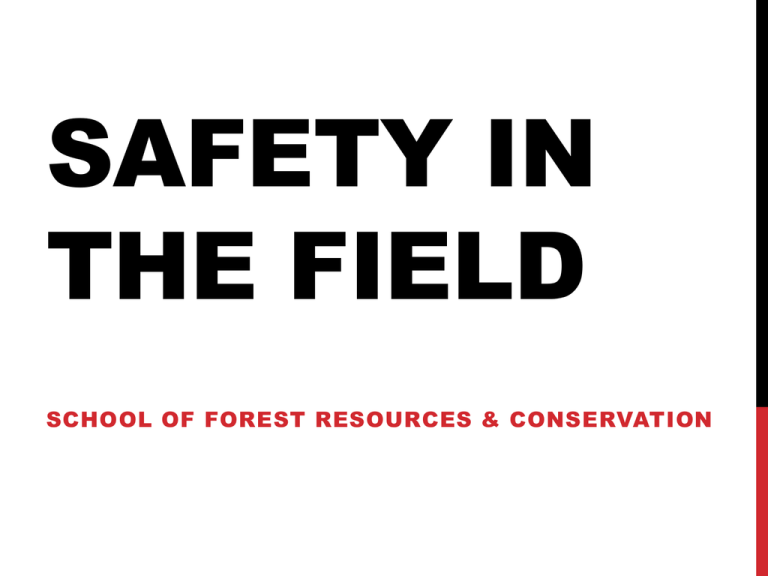
SAFETY IN THE FIELD SCHOOL OF FOREST RESOURCES & CONSERVATION SAFETY IS IMPORTANT Before you go out into the woods, you should be aware of the following: Personal Protective Equipment Weather Precautions Poisonous Plants Insects and Disease Venomous Snakes What to do if someone is hurt PERSONAL PROTECTIVE EQUIPMENT Safety Glasses Gloves Eyewear Head Protection Remember your orange vests during hunting season! Boots Snake Chaps PERSONAL PROTECTIVE EQUIPMENT Insect Repellent Sunscreen WEATHER Weather in Florida can change quickly, so you need to stay aware of the situation and take appropriate precautions when working outdoors. WEATHER: LIGHTNING Florida is the lightning capital of the world! Most fatal strikes occur BEFORE the storm begins. Lightning usually strikes the tallest object IF that object is a good conductor of electricity. Human bodies are good conductors. If you are caught in a storm, remember: 1) Remove all metal from your person and place it away from you 2) Crouch low where you are not the tallest or near the tallest object. 3) Do not crowd together with anyone else, and do not lie down! Beyond Thunder Dumb WEATHER: RAIN Storms don’t only bring lightning: Heavy rain can cause danger of impassable (muddy) roads, or falling trees Trees: https://www.youtube.com/watch?v=Pg-BoChR2xE WEATHER: HEAT Three levels of heat illness: Stress, Exhaustion, Stroke Medical emergency! • Moderate thirst • Pale, cool and moist skin • Heat cramps • Headache • Nausea and vomiting • Weakness and dizziness • Feels faint/collapsing Heat Stroke Heat Stress • Mild thirst • Impaired work performance (Heat fatigue) • Heavy sweating • Minor muscle “twitches” Heat Exhaustion WEATHER: HEAT, SYMPTOMS • Severe thirst • Confusion, hallucinations, and bizarre behavior • Hot, red, dry skin • Seizure • Unconsciousness TAKE BREAKS DRINK WATER SEEK SHADE REMOVE EXCESS CLOTHING …if you feel overheated, tell a classmate or instructor! POISONOUS PLANTS Poison Ivy LEAVES OF THREE, LET IT BE! Poison Oak Poison Sumac POISONOUS PLANTS How to avoid regret? Wear long pants, sleeves, and gloves! What to do if you can’t avoid it, or you forgot the cute slogan: • Rinse off the oil with COLD running water as soon as you can • Clean exposed skin with rubbing alcohol • Apply a treatment cream Video: http://www.youtube.com/watch?v=1pIspD66ZZw Good read: http://gizmodo.com/5906128/why-poison-oak-is-the-fingworst INSECTS AND DISEASE Little known fact: bugs live in the woods. You are likely to encounter: • Ticks • Mosquitoes • Ants • Chiggers …and more! Ticks can carry debilitating illnesses such as Lyme Disease or Rocky Mountain Spotted Fever. Mosquitoes can carry West Nile and other kinds of encephalitis. But you don’t have to let them bite you. INSECTS AND DISEASE Tick video – Bloodsucking Ninjas of Summer Prevention of ticks and bug bites: • Use repellent! (but ticks may still bite) • Wear light colors and long sleeves/pants • Inspect yourself after field work, especially “creased areas” of the body If you are allergic, tell your instructor before you go into the field. What should you do if you find one that has bitten you? INSECTS: TICKS Dealing with a “bite incident” Immediately remove attached ticks using tweezers, grasping as close to the skin as possible • Keep the detached tick, record date, work location, and bite location in your tick log, and verified by supervisor. • Disinfect the bitten area immediately and wash your hands • If a bull’s eye rash or any other symptoms develop, seek medical attention promptly. • Lyme disease: tiredness, stiff neck, fever, muscle aches, joint pain • RMSF: sudden fever, headaches, possible rash around ankles/wrists VENOMOUS SNAKES Florida has several important species of venomous snakes • Pit vipers: rattlesnakes, cottonmouths, copperheads • Hemotoxins in venom cause bleeding, intense pain, and muscle symptoms • Coral snakes • Neurotoxin in venom causes minimal pain, and late onset of abdominal pains, breathing difficulties, mental symptoms SNAKES: RATTLESNAKES SNAKES: COTTONMOUTH/COPPERHEADS SNAKES: CORAL SNAKES NOT coral snakes: Red and yellow will kill a fellow! SNAKES: IF YOU ARE BITTEN • No ice or other cooling agent on the bite. • No tourniquets. • No incisions in the wound. • Suction devices are not recommended. • No eating, drinking, especially alcohol. • No running or engaging in strenuous activities. An increase in heart rate will move the venom through your bloodstream faster. Best Snake Bite Kit SNAKES: GENERAL RULES #1 Rule: LEAVE SNAKES ALONE • Wear snake leggings • Watch where you put your hands and feet. • Exercise good judgment. • Don’t bother them, even if they are “dead.” –Two-thirds of people bitten in the US saw the snake before being bitten but attempted to kill, collect, or harass it. –Don’t kill snakes. People are bitten by snakes while trying to kill them. FIRST AID GUIDELINES #1 Rule: If it seems serious, CALL 911 FIRST! Assess scene and victim Alert (call 911) Attend to the Airway, Breathing, and Circulation Report any injuries to your instructor promptly. Burns: cool the area, cover with moist sterile gauze ONLY. Wounds or cuts: apply pressure until bleeding stops or you are at the hospital. Puncture wounds: do not remove object from wound. Eye injury: seek medical attention – leave it alone! Snake bite: identify snake, stay calm/don’t move, get to hospital. DON’T BE DUMB Staying safe is easy: USE COMMON SENSE. Dealing with injuries and accidents in the field is complicated, but prevention is simple! Stay close to your group or partner, stay aware of your surroundings, and use precaution in the form of PPE, repellents, don’t work outdoors in a storm, etc.

